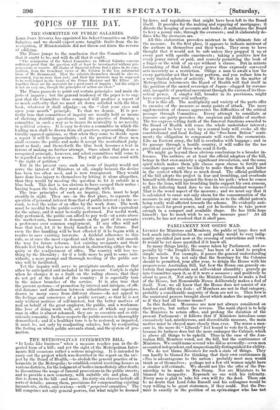TOPICS OF THE DAY.
THE COMMITTEE ON PUBLIC SALARIES.
LORD Imo; Russzia, has appointed his Select Committee on Public Salaries ; and we should expect some tangible fruits from the in- vestigation, if Ministerialists did not throw out hints the reverse of edifying.
The Times jumps to the conclusion that the Committee is all that it ought to be, and will do all that it ought.
" The nomination of the Select Committee on Official Salaries conveys sufficient proof that the question will at least be investigated without pre- possessions or reserve. All shades of financial reform find a place in its com- position, from the trenchant views of Mr. Cobden to the less substantial ideas of Mr. Drummond. That the animists themselves should be also re- presented, was no more than just ; and their fair interests may be supposed to be well lodged in the hands of the Prime Minister and Mr. Ellice. Al- together there are the materials for a good court of inquiry : but the subject is not an easy one, though the principles of action are clear."
The Times proceeds to point out certain principles and main ob- jects of inquiry ; but the general tendency of the paper is to sug- gest that the Committee thus composed will produce a report of so much authority that we must sit down satisfied with the blue book, whatever it shall adjudge—on the " shut your eyes and open your mouth" principle. To that we demur. It is per- fectly true that committees of inquiry are usually held as means of shelving doubtful questions ; and the practice of framing a committee in such a way as to insure its neutrality is no novelty in political science. It is easy to devise a committee in which the leading men shall be drawn from all quarters, representing diame- trically opposed opinions, so that when they come to decide upon a report it will be impracticable ; yet the position of those men shall overawe the public and make it accept the neutralized judg- ment as final ; and thenceforth the blue book becomes a text in favour of making no further attempt. Once admit that plan as a recognized principle, however, and select committees will come to be regarded as useless or worse. They will go the same road with " the right of petition." But in the present case, such an issue of inquiry would not serve the interest of Ministers at all, simply because the device has been too often used, and is now transparent. They would have done less injury to themselves by letting it alone altogether, than they would by mooting the question to let it subside in a blue book. This fact is too obvious to have escaped their notice : having begun the task, they must go through with it. The true principles of such an inquiry, then, must be kept steadily in sight. They are—in the first place, to separate the question of personal interest from that of public interest ; in the se- cond, to test the value of an office by the work done. The work must be needful to the public service, it must be a fair equivalent for the salary, and it must be really performed. For useful work, duly performed, the public can afford to pay well—at a rate above the market-rate, because it demands on the part of its servants a preference over common employment. If any office will not bear that test, let it be freely handled as to the future. But even the free handling will be best effected if it be begun with a resolve to save existing interests. A faithful adherence to this rule, as at once the most expedient and the most just, will smooth the way for future reforms. Let existing occupants and their friends feel that they have no interest in obstructing either the in- quiry or the readjustment of office. The country will lose no- thing by the liberality ; for if a trifle more be paid to some indi- viduals, a more prompt and thorough weeding of the public ser- vice will be facilitated.
Yet the inquiry will serve to precipitate another, unless that other be anticipated and included in the present. Carlyle is right when he charges it as a fault on the ruling classes, that they do not get at the talent of the country : it is especially true in the minor branches of the service. It is also true that the present systems—of promotion by interest and intrigue, of offi- cial distance and alienation between subordinates and superiors, drawn in many cases from different classes—do not appeal to the feelings and conscience of a public servant; so that he is not only without motives of self-interest, but the better motives of zeal on behalf of the great employer, the public, and a workman- like love of doing work well, are motives of which any young man in office is almost ashamed, they are so eccentric and so ridi- culously romantic. In those respects the public service is thoroughly demoralized ; and if a healthier tone is to be restored, or imparted, it must be, not only by readjusting salaries, but by readjusting the footing on which public servants stand, and the system of pro- motion.


























 Previous page
Previous page